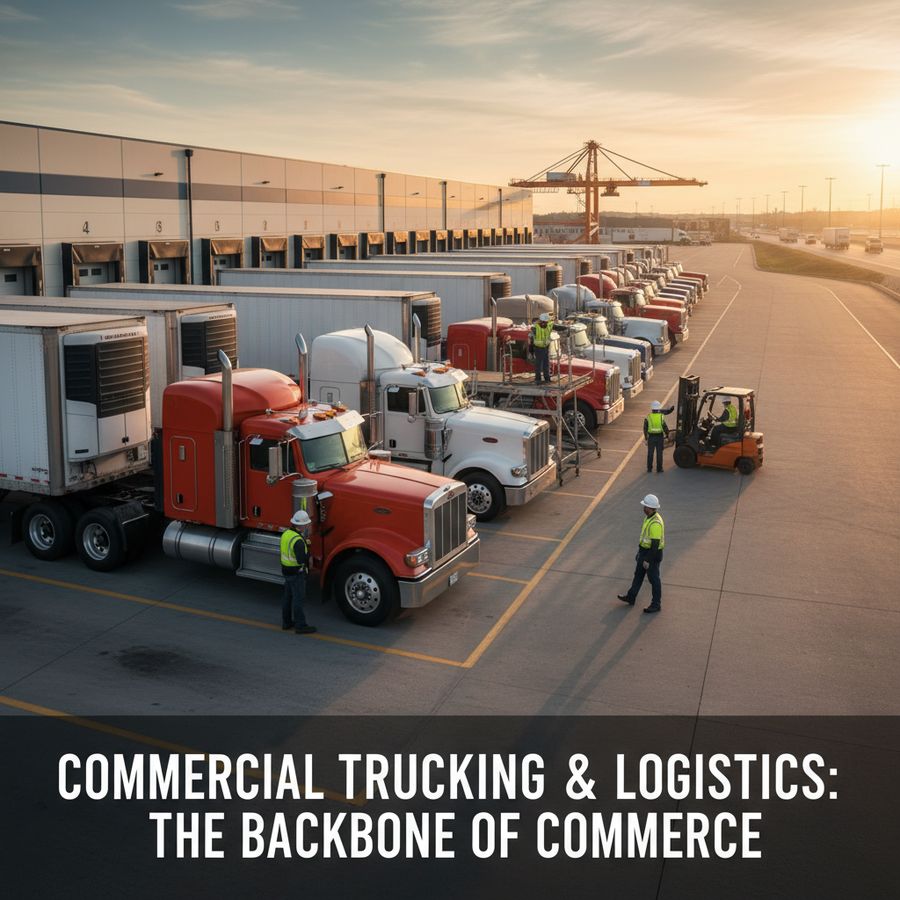How to Insure Different Types of Commercial Vehicles
Overview
Commercial vehicle insurance is a crucial aspect for any business that operates vehicles as part of their daily operations. Whether you manage a small fleet of vans or a large array of trucks, understanding the nuances of insuring different types of commercial vehicles can save your business from unexpected financial losses. Commercial vehicles are exposed to unique risks that differ significantly from personal vehicles, making tailored insurance coverage essential.
Businesses often rely on fleet insurance to cover multiple vehicles under one policy, simplifying administration and often reducing overall costs. This type of insurance typically includes mandatory third-party liability coverage as a baseline but can be expanded to include comprehensive protections that cover damage to your own vehicles, theft, and even legal assistance.
When insuring business vehicles, the type and use of the vehicle play a major role in determining the appropriate coverage. Insurers assess risk based on vehicle class, usage patterns, and driver history. For example, a delivery van might require different protections compared to a heavy-duty truck or a specialized motorcycle used for courier services.
"Fleet insurance streamlines the process of protecting multiple business vehicles, offering convenience and potential cost savings while ensuring comprehensive coverage tailored to your company’s needs."
In this guide, we explore the specific insurance considerations for various categories of commercial vehicles, including passenger cars, vans, trucks, motorcycles, and special vehicles. We also discuss licensing and geographic limits that impact coverage and offer insights into additional insurance options that safeguard your business assets comprehensively.

Passenger Cars and Vans
Passenger cars and vans are among the most common business vehicles, often used for transporting staff, clients, or light goods. Insuring these vehicles requires an understanding of the specific risks they face in commercial operations, which differ from personal use.
Vans insurance is typically structured to cover the vehicle against third-party liability, theft, fire, and accidental damage. Given their usage in urban environments and frequent stops, vans are particularly vulnerable to minor collisions and theft, making comprehensive insurance a wise choice for many businesses.
Fleet insurance options are highly effective for businesses operating multiple cars or vans. By bundling vehicles under one policy, companies benefit from streamlined administration and often receive discounts based on the number of vehicles insured. Moreover, fleet policies can be tailored to include additional protections such as legal assistance and coverage for goods carried in the vehicle.
When selecting insurance for passenger cars and vans, consider the following:
Usage type (e.g., delivery, client transport, employee use)
Driver profiles and experience
Vehicle value and age
Geographic regions of operation
Frequency and distance of travel
Choosing the right coverage ensures that your business remains protected from liabilities and vehicle-related disruptions, enabling smooth and uninterrupted operations.
Trucks and Trailers
Trucks and trailers are the backbone of many industries, especially logistics and freight. Insuring these heavy commercial vehicles demands a specialized approach due to their size, weight, and the nature of cargo transported.
Trucks coverage typically includes third-party liability, comprehensive coverage against damage from collisions, theft, and natural disasters, and often extends to cover the cargo being transported. Given the higher risks and potential for significant financial loss, insurers may require detailed information about the vehicle’s use, driver qualifications, and maintenance schedules.
Many businesses with multiple trucks opt for fleet insurance to manage their coverage efficiently. Such policies can be customized to include:
Coverage for trailers and attached equipment
Protection against cargo loss or damage
Legal assistance for traffic disputes or accidents
Accident and injury coverage for drivers
Due to the specific regulatory requirements surrounding commercial trucks, including licensing and road restrictions, comprehensive insurance plans often incorporate compliance assistance. This ensures your vehicles meet legal standards and remain covered across the regions where they operate.
"Proper insurance for trucks and trailers not only protects your investment but also safeguards your business reputation by ensuring reliability and compliance."

Motorcycles and Mopeds
Commercial motorcycles and mopeds are increasingly used for courier services, food delivery, and quick urban transport. Their small size and agility offer advantages but also present unique insurance challenges.
Insurance for these vehicles must address the higher accident risk associated with motorcycles and mopeds, as well as potential theft. Third-party liability is mandatory, but businesses often benefit from additional theft and damage coverage.
When choosing commercial vehicle insurance for motorcycles and mopeds, consider:
Usage intensity and typical routes
Driver experience and safety training
The value of the vehicle and any attached equipment (e.g., delivery boxes)
Geographic coverage, especially if vehicles operate across city boundaries
Some insurers offer specialized packages for motorcycle fleets, which can reduce premiums and simplify claims management. These packages often include accident insurance for riders and legal expense coverage in case of disputes.
Given the growing role of motorcycles and mopeds in commercial transport, tailored insurance solutions help businesses manage risks effectively and maintain operational continuity.
Vintage and Special Vehicles
Specialty commercial vehicles, including vintage cars, classic trucks, and specialized equipment vehicles, require distinct insurance considerations due to their unique value and usage patterns.
Vintage and special vehicles often have higher restoration and replacement costs, making standard commercial vehicle insurance insufficient. Insurers typically provide tailored policies that account for the vehicle’s appraised value, rarity, and intended use.
Businesses using these vehicles for promotional purposes, events, or specialized services should seek policies that cover:
Agreed value coverage rather than market value
Limited usage terms (e.g., event-based or seasonal use)
Protection against damage during transit or storage
Coverage for accessories and modifications
Many insurers also offer flexible policies that allow vintage vehicles to be included within a broader fleet insurance plan, ensuring all business vehicles are protected under one convenient policy. However, due to their special nature, these vehicles often require separate risk assessments.
"Insuring vintage and special vehicles demands a tailored approach that respects their unique value and usage, safeguarding your investment while supporting your business needs."
Licensing and Geographic Limits
Understanding licensing requirements and geographic limits is fundamental when insuring commercial vehicles. Insurance policies often vary based on where the vehicle is licensed and where it operates, directly impacting coverage validity and claims processing.
Commercial vehicle insurance must comply with local and international regulations, especially for fleets operating across borders. For instance, vehicles registered with a Dutch license plate but operating beyond Europe or in countries bordering the Mediterranean Sea may require extended geographic coverage.
Licensing categories affect the type of insurance required. Different classes of commercial vehicles, from light vans to heavy trucks and motorcycles, have specific licensing prerequisites that insurers consider during underwriting.
Key considerations include:
Ensuring the vehicle's registration matches the insurance policy
Confirming that drivers hold appropriate licenses for the vehicle type
Validating coverage for international travel or cross-border operations
Compliance with regional transport and safety laws
Failure to align licensing and geographic limits with insurance coverage can result in denied claims or legal penalties, making this an essential area for business vehicle owners to address proactively.
Conclusion
Insuring different types of commercial vehicles requires a comprehensive understanding of each vehicle's unique risks, usage, and regulatory requirements. Whether you operate passenger cars, vans, trucks, motorcycles, or special vehicles, securing the right commercial vehicle insurance is critical to protecting your business assets and ensuring operational continuity.
Fleet insurance emerges as a practical solution for businesses managing multiple vehicles, providing administrative ease and potential premium discounts. By customizing your insurance to meet the specific needs of your fleet—such as adding protections like legal assistance and cargo coverage—you can significantly enhance your risk management strategy. To learn more about how you can optimize your fleet insurance, visit Finass Verzekert.
Always consider licensing and geographic limits when selecting coverage to ensure your business vehicles remain compliant and fully insured wherever they operate. Partnering with experienced insurance providers can help you navigate these complexities, providing peace of mind and financial security.
"Effective commercial vehicle insurance is not just a regulatory necessity—it is a strategic investment that supports business resilience and growth."
Reacties
Een reactie posten